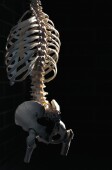
FRIDAY, June 22 (HealthDay News) — Young men receiving drug treatment for HIV infection are at increased risk for low bone mass, a new study suggests.
The findings indicate that these patients should exercise, take vitamin D and be closely monitored in order to reduce their future risk of bone fractures, according to the study, released online in advance of print publication in the journal Clinical Infectious Diseases.
The study included about 250 male participants, aged 14 to 25, who underwent whole-body scans to measure their bone density. Some of the men were infected with HIV, the virus that causes AIDS.
The participants with HIV had been diagnosed with the infection an average of two years earlier. The HIV-infected males had an average 5 percent to 8 percent lower bone density in the hip and 2 percent to 4 percent lower bone density in the spine than those without HIV.
Although the study uncovered an association between treatment for HIV infection and lower bone density in the study participants, it did not prove a cause-and-effect relationship.
The study, funded by the U.S. National Institute of Child Health and Human Development (NICHD), did not look at the causes of bone loss and cannot rule out the possibility that low bone mass was present before HIV infection.
The investigators noted that all the participants had several risk factors for bone loss, including tobacco and alcohol use and low intake of calcium and vitamin D, which is needed to absorb calcium.
“The young [HIV-positive] men in the study had been taking anti-HIV medications for a comparatively short time, yet they still had lower bone-mineral density than other men their age,” study co-author Dr. Bill Kapogiannis, of the pediatric, adolescent and maternal AIDS branch of the NICHD, said in an institute news release.
“These findings suggest a short-term impact of HIV therapy on bone at ages when people are still growing and building bone mass,” Kapogiannis added. “This raises concerns about the risk of fracture as they age.”
Previous research in adults has indicated that there may be an association between the use of certain anti-HIV medications and an increased risk for bone fractures and bone loss, the study authors noted in the news release.
Doctors who care for young men with HIV should monitor these patients regularly for signs of bone thinning, which could predict a risk for fractures, the researchers said. Young men newly diagnosed with HIV also should exercise, quit smoking, limit alcohol consumption and get the proper amount of calcium and vitamin D.
More information
The New Mexico AIDS Education and Training Center outlines the side effects of anti-HIV drugs.

